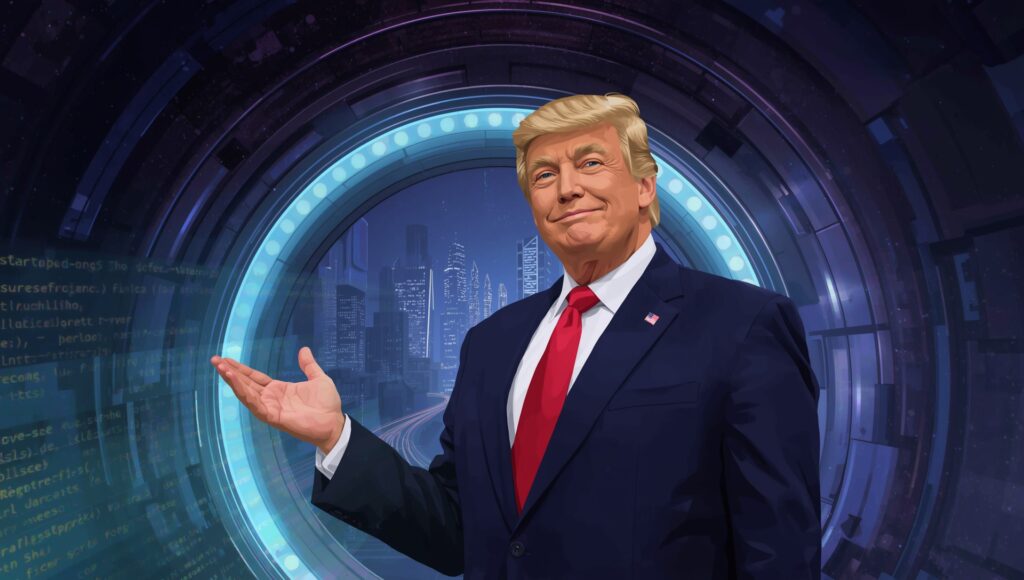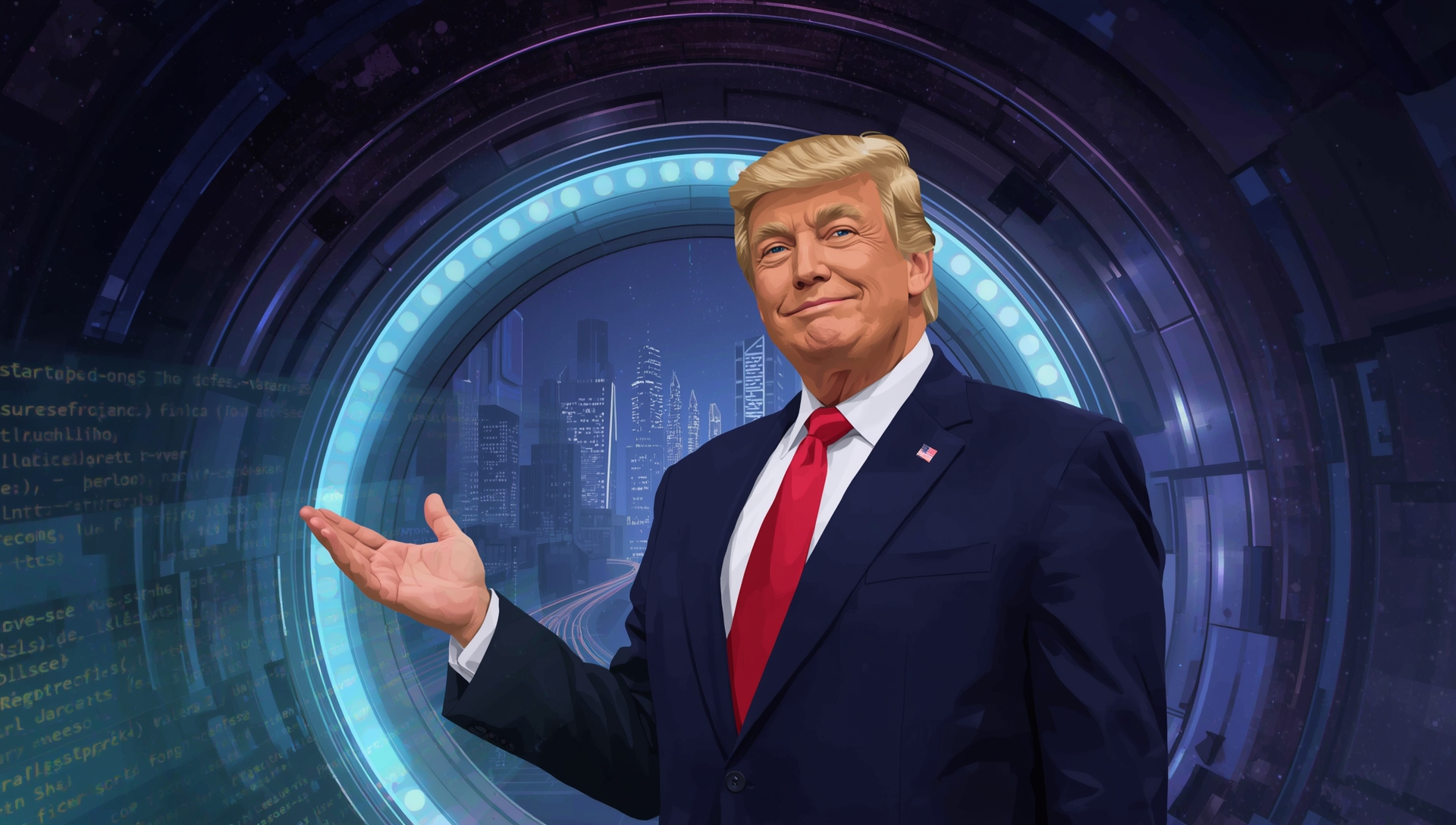Artificial Intelligence (AI) is no longer just about smart assistants or chatbots—it has become a matter of national security, economic dominance, and technological leadership. In early 2025, former U.S. President Donald Trump made headlines with the announcement of a new AI initiative called the Stargate Project.
Unlike ordinary tech projects, Stargate is designed to be a massive government–private sector partnership with the goal of positioning the United States as the global leader in artificial intelligence. This project has already sparked excitement, curiosity, and controversy across industries, politics, and global markets.
So, what exactly is Trump’s Stargate AI Project, and why is it being called one of the most ambitious AI initiatives in history? Let’s dive in.

What is the Stargate AI Project?
The Stargate AI Project is a large-scale U.S. initiative aimed at developing advanced artificial intelligence infrastructure, research, and applications. The name “Stargate” reflects its vision: creating a gateway to the next era of AI innovation, with capabilities far beyond existing technologies like OpenAI’s GPT models or China’s DeepSeek.
While full technical details remain under development, official statements highlight the project’s focus on:
- Building a national AI infrastructure that can rival China’s large-scale systems.
- Integrating AI across defense, healthcare, education, and the economy.
- Strengthening AI safety, ethics, and regulation while ensuring American leadership.
- Public–private collaboration, involving major tech firms, universities, and startups.
Background and Motivation
Trump’s Stargate AI Project did not emerge in isolation—it was influenced by several key global developments:
- China’s AI Leap (DeepSeek) – In January 2025, Chinese startup DeepSeek launched its R1 model, which shocked the AI world with its low-cost, high-performance capabilities. This caused major concern in Washington about America falling behind in the AI race.
- Geopolitical Competition – The U.S. views AI as a strategic technology, similar to nuclear energy in the 20th century. Whoever dominates AI could lead in military defense, economic growth, and global influence.
- Economic Pressure – With AI reshaping industries, from software development to healthcare, the U.S. risks losing jobs, investments, and innovation to foreign competitors if it does not act quickly.
The Stargate Project is therefore seen as America’s “Sputnik moment” for AI—a rallying call to reclaim leadership in this transformative technology.
Key Objectives of the Stargate AI Project
1. National AI Infrastructure
The initiative aims to establish supercomputing centers and AI research labs across the U.S. These facilities will provide computing power, datasets, and open platforms for both public and private AI research.
2. Defense and Security Applications
Stargate is expected to develop AI-powered defense systems, including:
- Cybersecurity enhancements to protect critical infrastructure.
- Military intelligence and autonomous defense systems.
- Countermeasures against foreign AI threats (especially from China and Russia).
3. Education and Workforce Development
A major part of Stargate is preparing Americans for an AI-driven economy. Plans include:
- AI-focused training programs and university partnerships.
- Scholarships and incentives for AI researchers.
- Nationwide reskilling efforts for workers affected by automation.
4. Healthcare and Biotechnology
Trump’s team has emphasized using AI to improve healthcare outcomes. Applications could include:
- AI-powered drug discovery and precision medicine.
- Faster diagnostics and medical imaging analysis.
- Predictive healthcare systems for public health crises.
5. Regulation and Safety
Unlike China’s state-controlled model, the U.S. wants Stargate to balance innovation with ethical safeguards. This includes:
- Transparent AI governance.
- Strict privacy protections.
- Ethical frameworks for AI in sensitive sectors.
Partnership with Private Tech Companies
The success of Stargate depends on collaboration with leading U.S. tech firms, including:
- Microsoft, Google, Amazon, and Nvidia – expected to provide computing power, cloud infrastructure, and AI expertise.
- OpenAI, Anthropic, and Cohere – potential collaborators on advanced AI models.
- Universities and research labs – to drive innovation and talent development.
Trump’s announcement stressed that American companies must lead the project, unlike China’s centralized model, which is government-dominated.
Funding and Scale
While exact numbers have not been finalized, early reports suggest billions of dollars in federal funding will be allocated to Stargate. Private sector partners are also expected to invest heavily.
Analysts predict this could become one of the largest U.S. government–tech partnerships since the Space Race, possibly rivaling defense budgets due to its national security importance.
Potential Benefits
- Global AI Leadership – Stargate could place the U.S. back at the forefront of AI research and application.
- Job Creation – By reskilling workers and opening new industries, the project could create millions of jobs.
- National Security – Stronger AI defense systems would protect the U.S. from cyberattacks and foreign threats.
- Healthcare Breakthroughs – AI-driven drug discovery and diagnostics could save lives and lower costs.
- Innovation Boost – Startups and universities will gain access to advanced AI infrastructure, accelerating discoveries.
Risks and Challenges
1. Political Controversy
Since the project is tied to Trump, it faces partisan divides in Washington. Critics argue it may prioritize politics over scientific independence.
2. Privacy Concerns
Large-scale AI requires vast amounts of data. Civil rights groups fear that Stargate could lead to mass surveillance if not properly regulated.
3. Dependence on Big Tech
If dominated by major corporations, smaller startups may struggle to compete, potentially leading to monopolies.
4. International Reactions
China, Russia, and the EU may respond with their own accelerated AI initiatives, escalating the global AI arms race.
5. Economic Uncertainty
While AI may create jobs, it will also displace millions of workers. Managing this transition is one of Stargate’s biggest challenges.


